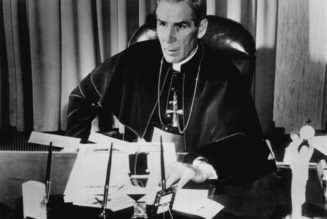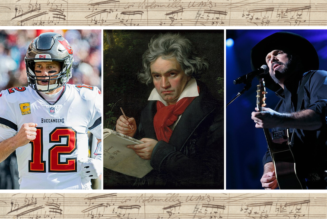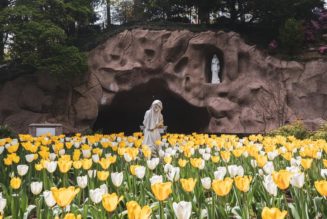By Fr. Jerry Pokorsky ( bio – articles – email ) | Jun 05, 2023
We all have routines, necessary but dull. We brush our teeth in the mornings, wash, feed the kids, and drive to work according to schedule. Variety is the spice of life. So, we break up our routines with birthday parties, vacations, weddings—even funerals. But a closer inspection reveals that these breaks in our rituals—such as birthday parties—are also routines of everyday life.
The life of the Church has similar routines.
The Sacred Liturgy is routine. The liturgical year relives the Apostles’ Creed and includes Advent, Christmas, Ordinary Time, Lent, Easter, the Ascension, Pentecost, Corpus Christi, and the feast of Christ the King. Since Advent, we’ve seen God’s revelation of His inner nature: Father, Son (Christmas & Easter), and Holy Spirit (Pentecost). Scriptures—beginning with creation and concluding with the descent of the Holy Spirit on Mary and the Apostles—reveal God is three Persons in One. The Solemnity of Christ the King anticipates the restoration of all things in Christ.
Sunday Mass attendance is part of the Catholic routine. Going to Mass on Sunday honors the Third Commandment. Should we miss a detail of Church teaching on any given day, we can simply stay tuned; we’ll cycle through the liturgical calendar next year. The liturgy is routine, like waking up and brushing our teeth every morning. The ritual integrates our earthly and spiritual lives.
We often don’t have patience for our routines. Every generation seems to need something new and exciting, and our restlessness agitates for constant change. Impatiently, we occasionally conclude the liturgical year is too dull in its routine. So we try to introduce some variety in the Church’s life. How else will we keep people in the pews and reach our young people?
Many readers will remember the turbulent years after the Second Vatican Council. Many grey-haired folks endured the hootenanny Masses, folk Masses, and even polka Masses of yesteryear. The liturgical flimflam was exciting for a time. In a bizarre symbiotic frenzy, priests and laity happily conspired to entertain. But we soon discovered that the routines of Masses with balloons and liturgical dance grew—well, boring. It was hard work for a priest to be “relevant” week after week. We became a laughing stock, with fewer and fewer people taking us seriously. A friend in the 1970s said that he found the Catholic faith attractive but observed Catholics have “lost their self-respect.” He remains a Protestant to this day.
Church authorities continue to worry about the dullness of the Faith. The center of restless gravity has shifted from the liturgy to Catholic doctrine, as provoked by the Synod on Synodality. As with the liturgical innovations in the 1960s, we want Catholic teaching to keep up with the times and retain the young people in the pews. We even discover “new insights,” cloaking infidelity with pseudo-intellectual rationalizations. To the surprise of “old-time religion” Catholic dullards, “modern anthropological studies” help us understand that the story of Sodom and Gomorrah wasn’t about unnatural sex. It was about hospitality. (Never mind that these cancerous nodules have been around for decades.) So modern theological studies reveal that the Sixth Commandment is pre-Vatican II and no longer applies!
Some insist: We need a vibrant Church to appeal to the youth. Young college Catholics mock the Faith for its old-fashioned dullness. Of course, they haven’t seen the inside of a church since Confirmation and know barely enough of the routine to hold the Church in contempt. They don’t know the Ten Commandments but know how to violate them. A gay-friendly church will never bring the infamous Sisters of Perpetual Indulgence to their knees in worship. Their life rituals necessarily exclude true religion. An artificially “relevant” church designed to attract and sustain members is, ultimately, irrelevant.
I recently walked a major metropolitan mall. None of the young people recognized or were curious about my priestly garb. Unexpectedly, the desolation of the experience bolstered my spirits. They were in a world of hopeless materialism. It isn’t hard to notice the pattern. Salvation does not come from iPhones alone. We are returning to the despair of the ancient pagan religions, and hopelessness always precedes hope.
The modern new-and-exciting social and moral experiments will also become routine and bring boredom inflamed by frustration and anxiety. We are beginning to see the unhappy effects of the widespread self-delusion, self-destruction, and slavery of anti-Christian life. The Romans and Greeks had the comforts of their time. But they were slaves to their passions, living without meaning. Without hope, many were receptive to hearing the Good News.
The Sacred Liturgy and the liturgical seasons, year after year form the bedrock of hope and human happiness. Through the Liturgy and Sacraments, God never tires of expressing His love for us, even if we tire of hearing from Him. Through sacred rituals, He affirms our human dignity as His good creation. He teaches us to love: week after week and year after year-—if we have the ears to hear and eyes to see.
The liturgy is like the mighty Hudson River on a calm day. Its glass-like tranquility may seem like a serene expanse, but underneath, the power of its current surpasses the energy of an atomic bomb.
Jesus promises, “Heaven and earth will pass away, but my words will not pass away.” (Mt. 24:35) The routine of the Mass, the Sacraments, and the liturgical year guarantee that the words of Jesus will never pass into oblivion. The prospect is assuring-—even exciting-—and offers the consolation of His eternal love. Our faithful response brings peace and salvation.
Are you bored with the Church and seeking something new and exciting? We bid you farewell. Or maybe you’re weary of all the hypocritical Catholics. Come back anytime. We always have room for one more. Regardless, we’ll be waiting for you in friendship and understanding. No fanfare. The church door will be open. Please check the Confessional schedule.
We dare to be dull.
Sound Off! CatholicCulture.org supporters weigh in.
All comments are moderated. To lighten our editing burden, only current donors are allowed to Sound Off. If you are a current donor, log in to see the comment form; otherwise please support our work, and Sound Off!











